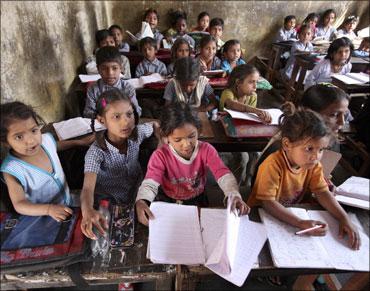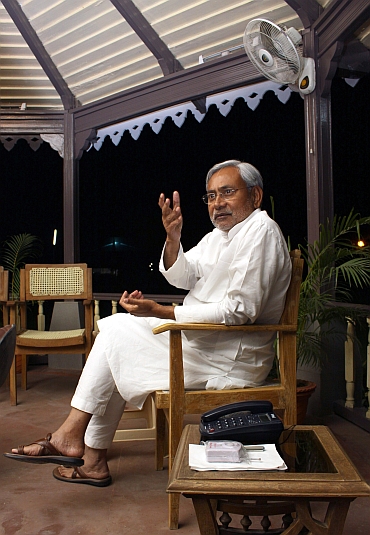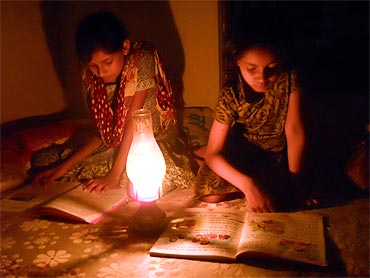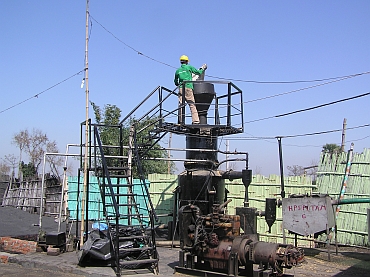 | « Back to article | Print this article |
Solar energy to make Bihar 'bright'
In power-starved Bihar, solar energy is all set to light up the lives of school children. With the use of solar energy thousands of students will now be able to avail of computer and laboratory facilities, which they have been deprived of because of the acute shortage of power.
"Solar energy will provide more opportunities and work as a miracle for schools and students," said Anjani Kumar Singh, principal secretary, human resource development department, Bihar.
Singh admitted that acute power shortage in Bihar has been the biggest problem faced by educational institutions, particularly the government-run schools in urban as well as in rural areas. But this all set to change soon.
Click NEXT to read further...
Rooftop solar panels to the rescue
The Bihar School Examination Board has decided to provide 10-kilowatt power to each school under the Centre's Jawaharlal Nehru National Solar Mission scheme. "The board is serious about providing solar energy to schools. We are exploring possible options," a board official said.
According to board officials, there is a Rs 1.25 lakh subsidy for every KW of solar energy for captive consumption in educational institutions.
The board is planning to provide electricity to schools through rooftop solar photovoltaic systems. The system will offset the requirement for grid energy and also provide power backup.
Nitish Kumar's house, office to go green
In the backdrop of the power crisis, 1 Anne Marg, the official residence of Chief Minister Nitish Kumar is all set to go green. Kumar has asked officials to convert the thermal power system supplying energy to the building to the one that runs on solar power. He has also directed the officials to make a similar change in the electricity supply system at his office, adjacent to 1 Anne Marg.
An official from the chief minister's office told rediff.com that is the first time ever that a CM will switch from the use of thermal to solar energy. "It will set a model for others. Nitish Kumar's approach for eco-friendly energy is practical, especially at a time when climate change is a big concern worldwide," he said.
Nitish Kumar, popularly known as vikash purush in Bihar, for initiating several development projects in last five years, told a gathering of energy experts last week in Patna that there was a need to popularise solar energy. "The demand for thermal power will not die down overnight. There is a need to demonstrate practically that solar energy works," he said.
'Will popularise the use of solar power in Bihar'
NItish said that if his official residence and office building will be lit up by solar energy, people in rural Bihar will not hesitate to use it.
According to official sources, a solar power project for supplying energy to the building will be launched soon.
In a bid to promote renewable energy in Bihar, the state government in June announced its new and renewable energy policy 2011. The policy aims to promote and attract entrepreneurs wishing to set up power plants based on renewable energy sources such as biomass, solar wind and hydroelectricity, among others to help strengthen power generation in the state.
Renewable energy is the buzzword in Bihar
Ajay V Nayak, principal secretary, state energy department, said that new and renewable energy sources have the potential to generate around 2,000 MW of power in the state.
The policy promises a slew of incentives for those entrepreneurs who wish to set up power plants based on renewable energy sources.
The State Investment Promotion Board has cleared proposals to generate around 400 MW alone from biomass. Moreover, the state can generate power from 180 MW alone from rice husk, which has become quite popular. Another 80 MW could be generated from municipal wastes, say sources from the energy department.
Bihar at present generates around 6 MW from biomass plants, around 4 KW from solar power plant at Patailiya village in Samastipur district and about 55MW from hydroelectric power plants.




